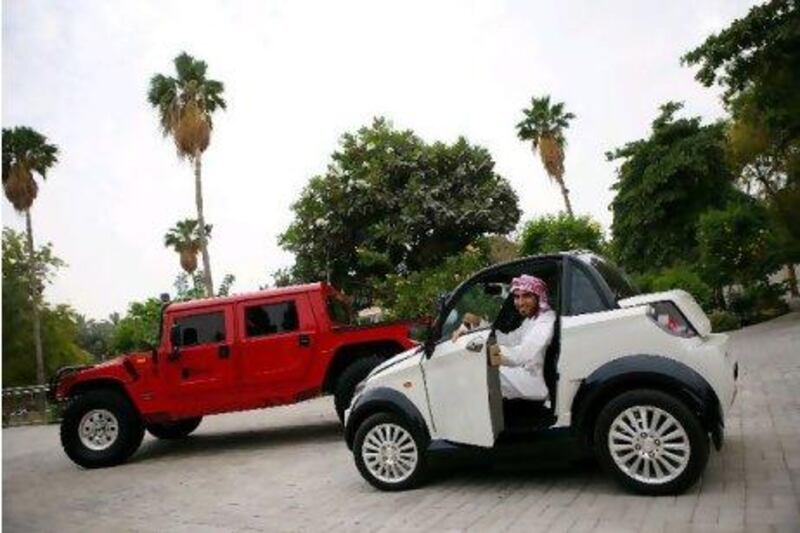While drivers in Europe and Asia are being continuously forced to be greener with high vehicle taxes and fuel costs, the UAE remains a haven for those who enjoy the power of imposing 4x4s and high-performance sports cars. However Yousif Bin Saeed al Lootah, who is Emirati, has decided to take another route altogether.
Al Lootah owns two electric cars, a MyCar and a Reva. Both two-seaters, his MyCar has a top speed of 64kph and can travel 96km on an eight-hour full charge. The quicker Reva reaches 80kph but will go 80km on a charge. Both cars can be plugged into any 15-amp socket and are fully automatic.
CEO of Dubai conglomerate SS Lootah Group, al Lootah is passionate about the environment and says he was the first, in 2008, to introduce electric cars into the Gulf region. Two years later, he built a biodiesel production facility in Dubai, Lootah Biofuels, where he converts cooking oil to fuel his large organisation's fleet of vehicles.
Al Lootah seems amused to be asked the familiar question of why he drives electric cars. "It's not just about the zero emissions, as the electric cars also have cost advantages. They're also compact and fit my ideal of a city car, fulfilling the needs of a metropolitan motorist's average daily trip of 40 to 80 kilometres."
But al Lootah's interest in eco-mobility obviously doesn't stop at electric cars.
"My interest in environmentally friendly transport began in 2005 when we initiated the Green Car Program to promote sustainable transportation, converting part of our company fleet to compressed natural gas [CNG]. After careful study of European models and extensive travel to compare options, I created the blueprint of our biodiesel project.
"Biodiesel in a conventional diesel engine substantially reduces emissions and no engine modification is required if biodiesel is 10 per cent or less of fuel used. This type of fuel is also very economical and once the technology becomes more widely available, it can be significantly less expensive than gasoline and other fossil fuels," he says.
The group's inspiring Green Car Program has continued to gather momentum, having successfully implemented five per cent biodiesel in its company fleet of 130 Ready-Mix Mercedes Actros heavy trucks.
"Switching over to biodiesel and electric cars not only saves money, but also helps our environment for future generations. There is also a solid economic rationale, as biodiesel produced from used cooking oil has cost advantages and, by recycling the used cooking oil, we are managing a waste that otherwise has negligible value as a raw material.
"Emiratis are well known for driving fast and powerful cars and I always encounter curious faces as I drive an electric car or a biodiesel-powered car. People repeatedly ask me why I'd drive such a car, but increasingly they've been asking where they could get one too. I've noticed more people are now ready to change their habits and adopt more sustainable transport modes. Some of our employees have changed their attitudes and also shifted from cars to hybrid vehicles and bikes, which pleases me immensely. I truly believe environmentally friendly cars can completely replace the rest with the technological advancements and mindset changes that are already happening worldwide," he says.
Whether it takes a little longer in the Middle East for such a dramatic transformation without dramatic increases in fuel costs and emissions taxes remains to be seen. Al Lootah explains some major changes will need to happen first.
"What's important is that infrastructure for the electric car is put in place here, with charging stations in many inner-city locations and exclusive car parking in public places, such as malls. In cities like London parking is free for electric vehicles, which sends a message and encourages more people to turn to electric cars.
"Companies in the Middle East are becoming more aware of the fact they will not only be judged on their economic performance but also on their impact on the environment and society as a whole. As businesses become more committed to sustainability, they have begun to acknowledge the importance of environmental protection as a core business strategy, so I'll continue to drive my 'green' cars with pride and look forward to the day everyone else is doing the same."
To mark Earth Week, The National directs its focus on the environment highlighting the need for education and attention to the needs of our planet at Green Issues.






